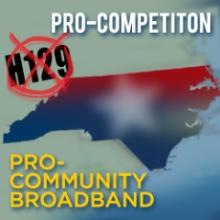By
on

I wrote an op-ed for the Durham Herald Sun about the efforts in North Carolina to limit local authority to build community networks. We will continue heavy coverage on North Carolina and other states in danger of passing anti-competitive, pro-monopoly legislation proposed by powerful, massive carriers. Here is the op-ed:
After more than four years of lobbying, Time Warner Cable may finally succeed in restricting the authority of local communities to build their own broadband networks.
Its legislation, H 129/S 87, will enact a host of special requirements for publicly owned networks that do not apply to networks run by the cable and phone companies.
The "Level Playing Field / Local Gov't Competition" bill could more appropriately be called the "Monopoly Protection Act." Rather than actually leveling the playing field, this bill solely disadvantages publicly owned networks.
Time Warner Cable has convinced the House that a massive $18 billion-per-year company operating one of the largest telecommunications networks on the planet, is powerless to compete against a community-owned network like Greenlight in Wilson or Fibrant in Salisbury.
Bill sponsor Rep. Marilyn Avila has simply had enough of "predatory" (her word) local governments shaking down AT&T and TWC. The champion of a similar bill last year, Sen. David Hoyle, candidly admitted it was written by TWC. There is no reason to suspect anything changed this year.
But perhaps the more fantastical element of this story is that the Legislature's biggest broadband priority is to limit, not expand, broadband investments in the state ranked 41st in broadband. Just how bad is North Carolina's broadband? When Broadband.com launched its new map showing the prices paid by small businesses for broadband, seven of the 10 most expensive cities were located in North Carolina. Anchorage barely beat out Greensboro for the highest average price per Mbps. This is why major private sector companies like Google and Intel have gone on the record opposing TWC's bill.
Fast, reliable, and affordable access to the Internet is essential for communities to thrive in the modern age. This realization led Wilson and Salisbury to build their own globally competitive networks, which offer the best available connections in the state.
Companies like Time Warner Cable and CenturyLink have neither the capacity nor willingness to make similar investments. They require a fast shareholder return on their investments. But next-generation networks take many years to break even.
It is more profitable to continue offering last-generation DSL and cable services to residents and businesses with no better options. In short, these companies are more accountable to Wall Street than Main Street.
They have found it more expedient to lobby the Legislature than invest in next-generation networks, while making absurd claims that no community has succeeded in building its own broadband network.
 They know legislators will not bother to call Bristol Virginia Utilities to learn the story behind their profitable, job-creating, network -- just one of many. BVU's infrastructure investment attracted hundreds of private sector jobs offering salaries at twice the median wage. Being publicly owned, the network profits are reinvested locally, offering more bang for the buck.
When pressed on specific examples of community network failures, TWC and its allies may cherry pick a few that have legitimately struggled, out of over 130 citywide publicly owned networks. Or they cite networks that are a few years old and have operating losses -- as they have done with Wilson. But any major telecommunications network, public or private, suffers losses in the early years. Networks require massive upfront investments long before they can start collecting revenue. And the process of connecting subscribers takes time -- especially when they do not rudely rush through the process.
Business plans forecast and expect these losses.
The track record of community broadband networks is overwhelmingly positive, which is why companies like TWC and CenturyLink work so hard to preempt them in state legislatures.
This bill carves out unique barriers for publicly owned networks, such as restricting where they may offer services, a dramatic reversal of the legislature's approach to privately owned networks: reducing regulations on where they offer services.
TWC and other private companies can offer loss leaders to bleed community networks of revenue but community networks are subject to strict price regulation from the state. Nonprofit networks will be compelled to pay taxes "that would apply" to a private provider, ignoring that TWC routinely avoids paying its taxes.
By implementing this de facto ban, North Carolina would be the 19th state to create hurdles specifically for community broadband. Of the other 18 states with barriers, most are less restrictive, preserving some local right of self-determination. This bill makes building a community network all but impossible.
Legislators should do what is best for the vast majority of businesses and citizens of North Carolina, preserving the ability of communities to decide for themselves whether to build the networks necessary for future economic development, education, health care, and a high quality of life.
Read more: The Herald-Sun - Corporations are trying to monopolize broadband
They know legislators will not bother to call Bristol Virginia Utilities to learn the story behind their profitable, job-creating, network -- just one of many. BVU's infrastructure investment attracted hundreds of private sector jobs offering salaries at twice the median wage. Being publicly owned, the network profits are reinvested locally, offering more bang for the buck.
When pressed on specific examples of community network failures, TWC and its allies may cherry pick a few that have legitimately struggled, out of over 130 citywide publicly owned networks. Or they cite networks that are a few years old and have operating losses -- as they have done with Wilson. But any major telecommunications network, public or private, suffers losses in the early years. Networks require massive upfront investments long before they can start collecting revenue. And the process of connecting subscribers takes time -- especially when they do not rudely rush through the process.
Business plans forecast and expect these losses.
The track record of community broadband networks is overwhelmingly positive, which is why companies like TWC and CenturyLink work so hard to preempt them in state legislatures.
This bill carves out unique barriers for publicly owned networks, such as restricting where they may offer services, a dramatic reversal of the legislature's approach to privately owned networks: reducing regulations on where they offer services.
TWC and other private companies can offer loss leaders to bleed community networks of revenue but community networks are subject to strict price regulation from the state. Nonprofit networks will be compelled to pay taxes "that would apply" to a private provider, ignoring that TWC routinely avoids paying its taxes.
By implementing this de facto ban, North Carolina would be the 19th state to create hurdles specifically for community broadband. Of the other 18 states with barriers, most are less restrictive, preserving some local right of self-determination. This bill makes building a community network all but impossible.
Legislators should do what is best for the vast majority of businesses and citizens of North Carolina, preserving the ability of communities to decide for themselves whether to build the networks necessary for future economic development, education, health care, and a high quality of life.
Read more: The Herald-Sun - Corporations are trying to monopolize broadband
 They know legislators will not bother to call Bristol Virginia Utilities to learn the story behind their profitable, job-creating, network -- just one of many. BVU's infrastructure investment attracted hundreds of private sector jobs offering salaries at twice the median wage. Being publicly owned, the network profits are reinvested locally, offering more bang for the buck.
When pressed on specific examples of community network failures, TWC and its allies may cherry pick a few that have legitimately struggled, out of over 130 citywide publicly owned networks. Or they cite networks that are a few years old and have operating losses -- as they have done with Wilson. But any major telecommunications network, public or private, suffers losses in the early years. Networks require massive upfront investments long before they can start collecting revenue. And the process of connecting subscribers takes time -- especially when they do not rudely rush through the process.
Business plans forecast and expect these losses.
The track record of community broadband networks is overwhelmingly positive, which is why companies like TWC and CenturyLink work so hard to preempt them in state legislatures.
This bill carves out unique barriers for publicly owned networks, such as restricting where they may offer services, a dramatic reversal of the legislature's approach to privately owned networks: reducing regulations on where they offer services.
TWC and other private companies can offer loss leaders to bleed community networks of revenue but community networks are subject to strict price regulation from the state. Nonprofit networks will be compelled to pay taxes "that would apply" to a private provider, ignoring that TWC routinely avoids paying its taxes.
By implementing this de facto ban, North Carolina would be the 19th state to create hurdles specifically for community broadband. Of the other 18 states with barriers, most are less restrictive, preserving some local right of self-determination. This bill makes building a community network all but impossible.
Legislators should do what is best for the vast majority of businesses and citizens of North Carolina, preserving the ability of communities to decide for themselves whether to build the networks necessary for future economic development, education, health care, and a high quality of life.
Read more: The Herald-Sun - Corporations are trying to monopolize broadband
They know legislators will not bother to call Bristol Virginia Utilities to learn the story behind their profitable, job-creating, network -- just one of many. BVU's infrastructure investment attracted hundreds of private sector jobs offering salaries at twice the median wage. Being publicly owned, the network profits are reinvested locally, offering more bang for the buck.
When pressed on specific examples of community network failures, TWC and its allies may cherry pick a few that have legitimately struggled, out of over 130 citywide publicly owned networks. Or they cite networks that are a few years old and have operating losses -- as they have done with Wilson. But any major telecommunications network, public or private, suffers losses in the early years. Networks require massive upfront investments long before they can start collecting revenue. And the process of connecting subscribers takes time -- especially when they do not rudely rush through the process.
Business plans forecast and expect these losses.
The track record of community broadband networks is overwhelmingly positive, which is why companies like TWC and CenturyLink work so hard to preempt them in state legislatures.
This bill carves out unique barriers for publicly owned networks, such as restricting where they may offer services, a dramatic reversal of the legislature's approach to privately owned networks: reducing regulations on where they offer services.
TWC and other private companies can offer loss leaders to bleed community networks of revenue but community networks are subject to strict price regulation from the state. Nonprofit networks will be compelled to pay taxes "that would apply" to a private provider, ignoring that TWC routinely avoids paying its taxes.
By implementing this de facto ban, North Carolina would be the 19th state to create hurdles specifically for community broadband. Of the other 18 states with barriers, most are less restrictive, preserving some local right of self-determination. This bill makes building a community network all but impossible.
Legislators should do what is best for the vast majority of businesses and citizens of North Carolina, preserving the ability of communities to decide for themselves whether to build the networks necessary for future economic development, education, health care, and a high quality of life.
Read more: The Herald-Sun - Corporations are trying to monopolize broadband Geoterm







